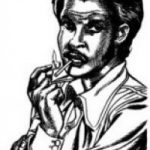
The 20th century’s answer to Sade is probably Jean Genet, a novelist and playwright who developed a strange kind of ascent through descent, finding a kind of apotheosis. If heroism is impossible, one distinguishes oneself through cultivating betrayal and abuse.
One of his plays was The Balcony (1956), a surreal exploration of fantasy and fetish.
Most of the scenes occur in the Balcony, a “house of illusions” or a brothel, depending on the mood of Irma, the house’s madam. Irma presides over the constantly shifting boundaries of fantasy and reality, dealing with clients who want to be Bishops and Generals, and may in reality be those things, a pimp who is actually a cowardly crossdresser and a whore who wants to be a saint. The Judge insists on hearing “true confessions” from a whore dressed as a criminal, who technically is a criminal, but the Judge shrinks from the thought that the woman actually committed any crimes.
One of the pivotal characters in the Chief of Police, who is disappointed that nobody wants to adopt his persona in their scenarios, instead preferring the Bishop or the General. The Chief is confident that he will defeat the Rebellion, and become a Hero of the people, who will then be fetishized.
Fetishization, both in the sexual sense and in a broader sense, is a key theme in the play. Both punters and prostitutes prefer their roles, represented by their costumes, to their actual lives, and many characters aspire to a kind of fetishistic apotheosis, existing as a pure archetype of power, static immortality/death. The stage directions describe the Bishop and other client characters wearing platform shoes while in costume, and many changes in costume. The costume is the role, the signifier the signified.
Meanwhile, revolution brews outside, with action in the play punctuated by explosions and machine gun fire from offstage. One of the Balcony’s prostitutes has quit and now joins the revolution, but gets “cast” as a martyr of the revolution, something she regards ambivalently.
The Chief of Police’s master plan is to use Irma and her clients as replacements for the Queen, the Bishop, the General and so on, after the “real” articles are killed. If the rulers cannot be killed on a symbolic level, the state they represent cannot be destroyed or changed, and the revolution will have failed.
As the Chief of Police and the others enact the plan, reality itself seems to crumble. We have no idea what’s going on outside the Balcony, whether the state or the revolution is winning, whether the Queen is alive or dead, or indeed whether it matters. Truth becomes a matter of consensus and costuming; nothing signified, only signifiers. The Bishop is just a guy in a funny hat, and the Queen is not even a person, but a word.

Genet understands that BDSM is about roles and power, and their ambivalent relationship with real world power and violence. Instead of sadomasochism encouraging or enabling real violence, in the play its practitioners have little stomach for reality at all. All of the “discipline and punish” action (to quote Foucault) produces a reassuring sense of order and stability in the world for the sadists. This denial is particularly necessary when the world outside the Balcony is going through a revolution.
However, the whole thing feels a little dated. Instead of abstractions like “the Queen”, we worship celebrities and politicians whom we know in excruciating detail. It’s been a long time since it was possible for keep secret that the President of the United States uses a wheelchair. Nowadays, the Queen would have to be seen, almost constantly.



